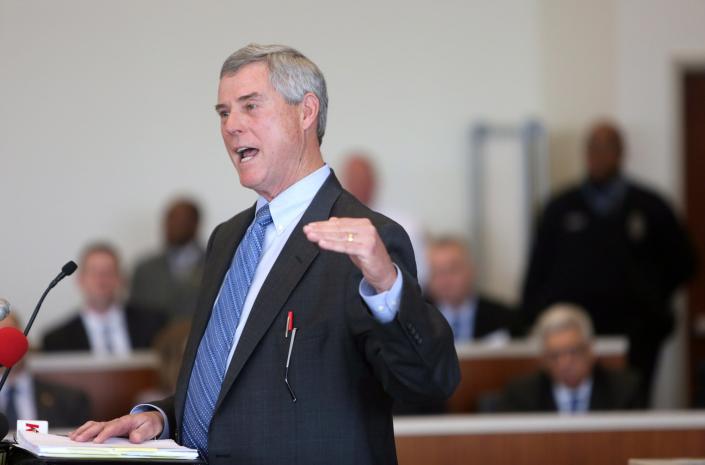Ferguson grand juror pushes back in battle to discuss Darren Wilson case

Ferguson, Mo., police Officer Darren Wilson had reason to fear unarmed teen Michael Brown when he fatally shot him last August — it’s now the conclusion of both state and federal authorities.
But just two days after the Justice Department released findings of its probe, a grand juror from the St. Louis County investigation continues to advance a legal battle with prosecutor Robert McCulloch, perhaps calling into question Wilson’s innocence.
On Friday the unidentified juror filed a 21-page memorandum arguing why U.S. District Judge Rodney Sippel shouldn’t dismiss their lawsuit against McCulloch.
The juror — one of 12 to sit on the secret panel — alleges McCulloch publicly misrepresented that “all grand jurors believed that there was no support for any charges,” according to the federal lawsuit. The juror contends McCulloch’s team gave jurors instructions in a “muddled and untimely” manner and presented the evidence in a way that insinuated that the dead teen, not the officer, was the wrongdoer.
[Related: Holder says U.S. will dismantle Ferguson Police Department if needed]
After hearing three months of testimony, it was announced in late November that the grand jury declined to indict Wilson in the racially charged case. The vote did not have to be unanimous. In Missouri, a consensus of nine is needed to rule.

Grand jurors take an oath or secrecy and are ordered to keep the panel’s deliberations and votes private. Under Missouri law, it’s a misdemeanor for a grand juror to disclose evidence or information about witnesses who appear before them.
“This case is about Doe’s First Amendment rights,” the lawyers wrote in Friday’s filing. “The claim that a citizen with information on a matter of public concern should be permitted to challenge the government’s narrative without going to jail is a cognizable First Amendment claim.”
Brown, who was black, was unarmed when he was fatally shot during a confrontation on Aug. 9, 2014, with Wilson, who is white. The shooting and lack of charges sparked days of violent unrest in the suburban St. Louis community and weeks of protests around the country. Wilson resigned from the police department a few days after the grand jury declined to indict him.
When a grand jury doesn’t recommend charges, the testimony and evidence presented to a panel is typically kept private. But with the international attention and controversy surrounding the Ferguson case, McCulloch made the unique move to discuss in detail why the officer was cleared. He also turned over all evidence — though some of it was heavily redacted — to the public.
“McCulloch speaks freely and purportedly openly about the very content about which Doe wishes to speak, just from a different viewpoint,” Doe’s lawyers write. “McCulloch has maintained exclusive control of the content and viewpoint disclosed to the public.”
[Related: Obama says he supports decision not to charge Officer Wilson]
On Friday Doe’s attorneys also raised the argument that the Supreme Court has held state officials may not thwart the rights of citizens to publish legitimate public information.

“For example, one question of significant public importance is whether the grand jury investigating Wilson did not return an indictment because McCulloch’s office misled the grand jury about the law,” Doe’s attorneys write. “McCulloch has given his view of the grand jurors’ thoughts. The twelve who know the answer are silenced by the challenged laws.”
Last month McCulloch’s defense team filed a motion requesting that Judge Sippel dismiss Doe’s suit because it would “threaten the continued health and sound functioning of Missouri’s grand jury system. Given the important state issues raised in this case, the court should abstain from exercising its jurisdiction over plaintiff’s claims.”
McCulloch, the county’s chief top prosecuting attorney for 24 years, encountered heavy criticism for refusing to charge Wilson himself or appoint an outside prosecutor.
When the DOJ cleared Wilson as well, some wondered if McCulloch himself might have experienced a sense of acquittal.
“I never felt incriminated, so there is no reason to feel vindicated,” McCulloch told reporters Wednesday.
Jason Sickles is a reporter for Yahoo. Follow him on Twitter (@jasonsickles).


